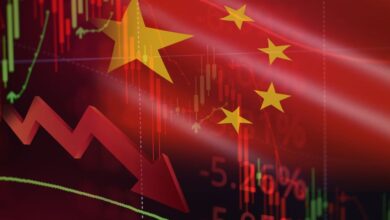Asian Markets Navigate Economic Uncertainty as Policy and Data Drive Sentiment

Asian stock markets concluded the week with a diverse set of outcomes, as investors across the region responded to a variety of economic signals and policy announcements. The Shanghai Shenzhen CSI 300 and Shanghai Composite in China experienced a modest retreat on the final trading day, indicating a temporary halt in the market’s upward trajectory. This pause comes despite the People’s Bank of China’s recent policy decision to lower the reserve requirement ratio for local banks, a move that had previously infused the markets with considerable liquidity.
Tencent Holdings Ltd. a prominent entity in the technology sector, faced a downward revision of its price target by Citibank. This adjustment reflects growing concerns over the deceleration of China’s video game industry. The Hong Kong Hang Seng index, where Tencent is a key component, subsequently fell by 0.3%. This decline, the index was set to end the week with an overall advance, marking a significant rebound from a previous 15-month low. The effectiveness of additional monetary stimulus in stimulating the Chinese economy is a subject of ongoing discussion, as indicators of consumer and business spending continue to exhibit signs of contraction.
Market observers are now shifting their attention to the forthcoming release of the Purchasing Managers Index data for January. This data is expected to provide further insights into the level of business activity at the onset of the year, potentially shaping market expectations and strategies.
In Japan, the Nikkei 225 index and the broader TOPIX index both saw declines, with the former dropping by 0.9% and the latter by 0.8%. This downturn is largely attributed to investors taking profits after the indices reached 34-year highs earlier in the week. The Bank of Japan’s Governor, Kazuo Ueda, has hinted at a possible alteration in monetary policy, suggesting that the era of ultra-low interest rates may be nearing its end as inflation approaches the bank’s target of 2%. This speculation was reinforced by Tokyo’s core inflation data, which reported a rate below 2% for the first time in more than 20 months.
Contrasting with the losses seen in other parts of Asia, Southeast Asian stocks, particularly in Indonesia, faced significant declines. The South Korean KOSPI index managed to defy the regional downtrend, advancing more than 1% as it recuperated from recent lows. With markets in India and Australia not participating in trading due to closures, the overall performance across the Asian region was notably mixed.
The Asian markets’ performance at the week’s end reflects the intricate dynamics of economic data, policy shifts, and market sentiment. While the initial rally in Chinese markets lost its momentum, Japan’s stock market grappled with a downturn amid profit-taking and indications of potential monetary policy adjustments. As the global financial community awaits additional economic indicators, the focus remains on the fundamental vigor and resilience of the Asian economies. The imminent Purchasing Managers Index data is poised to offer a more definitive view of the economic direction in Asia as the year progresses, leaving market participants watching closely for the next cues.
Source link



